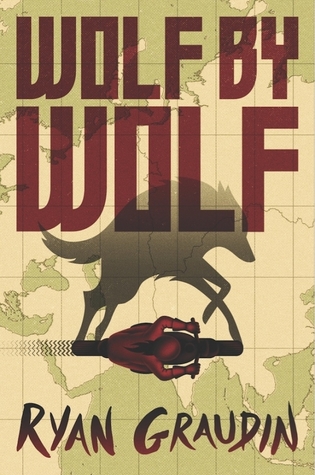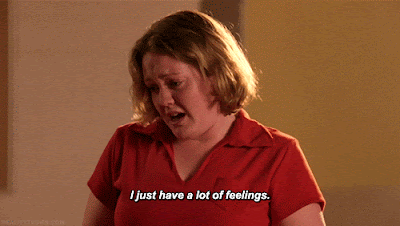I just read this entire series over the past 48 hours because it's the end of February and I'm so tired of cold and ice and snow that I needed summer.
Which is funny, because I had been saving this series for when it was actually summer so that I wouldn't die from longing.
I'm gonna break this review down by each book, since I didn't give any two of them the same rating. You'll notice that overall, the series kind of fizzled out for me.
The Summer I Turned Pretty ★★★★★
I really loved this book, you guys. It was perfectly light and fun and cute, but it also had a lot of heart that I don't think very many books like this get enough credit for. Belly is a perfectly relatable character, and honestly I wasn't even expecting to like her. The main reason I decided to buy this series in the first place was because so many reviews on Goodreads had called her annoying and insufferable—which are not the kind of words that compel most people to read a book, but I love buying books to spite reviewers who call the female protagonists "annoying." Annoying is not a meaningful criticism, and it's used toward girls almost exclusively; I can only think of one book I've seen whose male protagonist has been called "annoying" in a review. (It is so rare, in fact, for a male character to be referred to this way that I actually remember the exact book: The Name of the Wind by Patrick Rothfuss)
So anyway, I went into this book expecting Belly to be, much as I hate the word, annoying. I expected whiny and selfish and indecisive, but what I got instead was a normal teenage girl. Belly felt so real to me; I was nothing like her in high school, really (she is much more of a wide-eyed idealist than sarcastic, analytic me ever was), but I related to her as a girl whose family was important to her. I related to her as a girl who didn't like that growing up meant things had to change, and as a girl who both wanted people to see her differently and dreaded it at the same time.
Plus, there's the setting. My god, did I want Belly's life. The beach house, the traditions, the way it all felt like it could have been part of my own childhood even though I spent my summers nowhere near a beach, and the boys. I was fascinated by Belly's relationships with all three of the boys—Conrad, Jeremiah, and her brother Steven. And to be clear, she could never have had those relationships with them if she had been any different, if she had been less "annoying." Because being "annoying" to the boys was how she got to know them so well. It was how they developed their actual relationships instead of just having crushes on each other. If she had been quiet or aloof all those years, Conrad and Jeremiah would have had crushes on her the whole time, and it would have been over before it started.
Which brings me to my last point: the romance. Not romanceS. It's pretty clear in this book that Belly has eyes for only one boy, no matter how much she tries to convince herself she's into someone else. And I'm usually pretty good at picking the boy that the girl will end up with, but the little details about Conrad were so well-done that I totally believed in Belly's love for him even if I didn't understand him at all:
Conrad got up early to make a special belated Father's Day breakfast, only Mr. Fisher hadn't been able to come down the night before. He wasn't there the next morning the way he was supposed to be. Conrad cooked anyway, and he was thirteen and a terrible cook, but we all ate it. Watching him serving rubbery eggs and pretending not to be sad, I thought to myself, I will love this boy forever.
I mean, the boy is super closed-off and quiet and Belly might not be able to tell what's going on in his mind, but she notices things about him that completely justify her endless, occasionally hopeless crush. She kind of has a knack for seeing the good in everyone, honestly, but especially Conrad.
And let me just mention that in this book, it was clear that Conrad was the one who had always looked out for her, treated her like an actual person instead of just a little sister. Jeremiah didn't, no matter how much he'll pretend he did in the following books.
It's just. Ugh. This book—actually, the whole series—is so full of those moments, you know? The ones that make you go, Yes. This.
The ending of the book was perfect and probably could have stood alone.
It's Not Summer Without You ★★★★☆

I was disappointed to find out that her relationship with Conrad had slowly imploded, but then I thought, Well, Jenny Han is the master of the teenage crush. Maybe that's her thing. I was sucked back into Belly's feelings for Conrad independent of their failed relationship, and no matter how much of a jerk Conrad was being. Which, ahem: colossal jerk. *glares at Conrad*
And in comes Jeremiah, who we know has feelings for Belly now that she's pretty (harsh? oops), but who doesn't do anything about it until the book is almost over because he knows, he knows that she'll always choose Conrad. When he finally did act on his feelings, I was kind of like, Well, aren't you a glutton for punishment. Because, like I said, he KNOWS SHE WILL ALWAYS CHOOSE CONRAD.
I lost a bit of the respect I had for Jeremiah in this book because, while he spent most of the book acting the way one should when one is rejected, he eventually went back to trying to avoid the friendzone at all costs. Which, no.
I still loved this as the second book in the series; it kept me interested in the characters and where they were going, but I felt like it didn't answer quite enough questions, especially about Conrad. I assumed he acted the way he did because of Susannah dying, but I think the book needed his point of view more than it needed Jeremiah's. I got tired of reading about Conrad from everyone's perspective but his own, especially when they didn't understand him either.
Throw in Belly's apparent lack of romantic interest in Jeremiah until the very moment he kisses her and not only did I feel out of the loop, but I felt uncomfortable too.
Buuuuut a few things saved the book from a 3-star rating: Belly's missing Susannah (the part where she wanted to talk about the boys but not with her mom, and all she wanted was Susannah, ugh); the moments when Belly and Conrad were together and being nice to each other; and Belly's mom totally pwning Mr. Fisher.
We'll Always Have Summer ★★★☆☆

3 stars, for me, usually means "It was okay," or "I didn't really like it." Honestly, this book just confirmed my suspicion that The Summer I Turned Pretty didn't need sequels. It felt a little superfluous and a lot ridiculous.
Because Belly and Jeremiah have been in a relationship for 2 years, and then she finds out that he cheated on her (kind of), and then to make it up to her, he proposes??!?!?
AND SHE SAYS YES????!!!!
Like, what the actual f. I'm sorry, but this makes no sense. Is she really so desperate to become a Fisher that she'd marry the wrong brother (she knows he's the wrong one, let's be real), who she knows cheated on her, and whose faults she's been picking at incessantly? He orders the most expensive dinner. He snores when he's drunk, which is too often. He doesn't take his life seriously enough. Etc. etc.
Belly did not actually, legitimately annoy me until this book, but what annoyed me more was that the entire plot revolved around wedding planning. Which is not interesting to anyone except the people actually doing the planning—honestly, this is what I'm the most angry about. Too much of this book centered on caterers and invitations and the fricking carrot/chocolate raspberry cake, I almost went out of my mind.
And then there's Conrad, who's no longer being a total jerk and it's clear that Belly still has feelings for him, and yet she keeps stringing Jeremiah along and Jeremiah knows it, and nobody is doing anything about anything. Conrad is the only person in this book who did the right thing, and he ends up being depicted as the bad guy because the truth happened to break up the wedding???
There should have been more Conrad chapters because I was just so fed up with everyone else. Maybe then we could have seen more of his life in the past two years and why he never stopped loving Belly and how hard it was for him to be away while Jeremiah and Belly saw each other every day. We could have found out sooner why he pushed her away.
Anyway, the book was still written by Jenny Han so it was still good—like, the characters stayed true to themselves (mostly. I feel like Jeremiah acted a little out of character sometimes—petty toward Conrad and dismissive toward Belly), and I'm still in love with the insights and the setting and all that. I loved when Conrad talked to Laurel for Belly because it was one of those Yes, this moments, and I loved that Belly and Taylor were so close in this one.
But. Jeremiah deserved to be kicked where it hurts, Belly needed to be slapped upside the head, and that epilogue needed more build-up. If you ask me, the first half of the book should've been the almost-wedding, and then there should've been more of Belly and Conrad's relationship leading up to their actual wedding. It's not that it was too vague; it's that I didn't get to see any of the good stuff.














